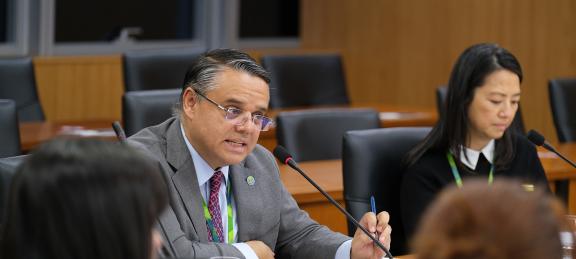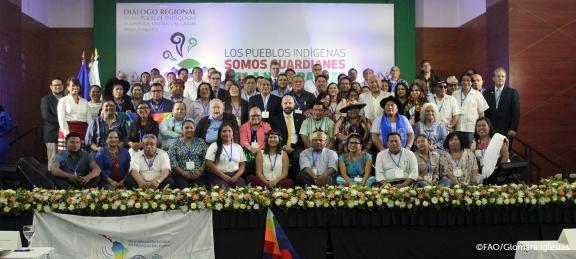Overview
Indigenous Peoples are unique and a distinct stakeholder of GCF. The rights of Indigenous Peoples are affirmed by international human rights instruments, including binding treaties and the United Nations Declaration on the Rights of Indigenous Peoples (UNDRIP). Indigenous Peoples have invaluable and critical contributions to make to climate change mitigation and adaptation. Yet they are also facing serious threats to the realization of their rights from climate change actions.
The importance of engaging with Indigenous Peoples in climate change policies and actions has been recognized by the Conference of the Parties (COP) to the United Nations Framework Convention on Climate Change (UNFCCC), including in the Cancun Agreement. The preamble of the Paris Agreement also acknowledges that Parties should, when taking action to address climate change, respect, promote and consider their respective obligations on, inter alia, the rights of Indigenous Peoples. The COP decision adopting the Paris Agreement recognized the need to strengthen practices and efforts of local communities and Indigenous Peoples related to addressing and responding to climate change and operationalised the local communities and Indigenous Peoples platform to help do this. The COP has further requested GCF consider a recommendation “to enhance [its] consideration of local, indigenous and traditional knowledge and practices and their integration into adaptation planning and practices, as well as procedures for monitoring, evaluation and reporting.”
Photo credit (top): L. Elías / Profonanpe
GCF's Indigenous Peoples Policy
The GCF Indigenous Peoples Policy recognises that Indigenous Peoples often have identities and aspirations that are distinct from mainstream groups in national societies and are disadvantaged by traditional models of mitigation, adaptation and development. In many instances, they are among the most economically marginalised and vulnerable segments of the population. The economic, social and legal status of Indigenous Peoples frequently limit their capacity to defend their rights to, and interests in, land, territories and natural and cultural resources, and may restrict their ability to participate in and benefit from development initiatives and climate change actions. In many cases, they do not receive equitable access to project benefits, or benefits are not devised or delivered in a form that is culturally appropriate, and they are not always adequately consulted about the design or implementation of activities that would profoundly affect their lives or communities.
The Governing Instrument for the GCF, as well as other policies, reflect the importance of fully and effectively engaging with Indigenous Peoples in the design, development and implementation of the strategies and activities to be financed by GCF, while respecting their rights.
This Policy will assist GCF in incorporating considerations related to Indigenous Peoples into its decision-making while working towards the goals of climate change mitigation and adaptation. The Policy allows GCF to anticipate and avoid any adverse impacts its activities may have on Indigenous Peoples' rights, interests and well-being, and when avoidance is not possible to minimise, mitigate and/or compensate appropriately and equitably for such impacts, in a consistent way and to improve outcomes over time. These elements of the Policy will be integrated with other business processes and governance frameworks and will be utilised across the organisation of GCF. The Policy is expected to evolve and continue to mature as GCF operations develop.
Indigenous Peoples Advisory Group
Established through the Indigenous Peoples Policy, the Indigenous Peoples Advisory Group (IPAG) functions to enhance coordination between GCF, accredited entities and executing entities, States and indigenous peoples in relation to matters concerning indigenous peoples. The IPAG Terms of Reference describe the roles and functions, membership, desired competencies, self-selection process and modalities of work.
Nominated through an indigenous Peoples-led self-selection process, the members of the Indigenous Peoples Advisory Group 2022-2024 are:
| Member |
|---|
| Balkissou Buba (Alternate) |
| Helen Bianglen-Magata (Alternate) |
| Juan Carlos Jintiach |
| Kimaren Riamit |
| Tunga Bhadra Rai |
| Viviana Figueroa (Alternate) |
Updates on the work of the IPAG are provided periodically to the Board in the Report of the Activities of the Secretariat as a dedicated annex - Outcomes related to the Indigenous Peoples Advisory Group.
| Ref # | Title | Date |
|---|---|---|
| GCF/B.36/Inf.14 | Report on the activities of the Secretariat | 26 Jun 2023 |
Approved readiness proposals
News + Stories

GCF Second Consultation Meeting drives momentum for the second replenishment
02 May 2023 / The Second Consultation Meeting (CM-2) for GCF’s second replenishment (GCF-2) was held on 27-28 April. Hosted by GCF and moderated by Dr. Mahmoud Mohieldin, the replenishment facilitator, the two-day virtual meeting convened current and prospective contributors where they received updates on GCF and discussed matters related to the replenishment process.

Amazon indigenous peoples hold key to forest’s future
26 Aug 2021 / The indigenous peoples of the Amazon have a key stake in our planet’s future. The release of the vast carbon reserves stored in the world’s largest rainforest would bring dire consequences for all of us. It is still possible to preserve the Amazon, but only by also focusing on the livelihoods of its indigenous peoples. See how here.

GCF ensures Indigenous Peoples play a key role in climate action
09 Aug 2020 / The Green Climate Fund (GCF) celebrates the International Day of the World’s Indigenous Peoples on 9 August. As fears rise over climate change melting glaciers around the world, the Kalash Indigenous Peoples in northern Pakistan are drawing on traditional knowledge to grow their own.

Protecting indigenous communities through GCF projects
14 Feb 2019 / GCF's support for Indigenous Peoples was a topic examined at the Fourth Global Forum on Indigenous Peoples, hosted by IFAD from 12-13 February 2019. Leonardo Paat, senior safeguards specialist at GCF, explained the various mechanisms implemented by GCF to support indigenous communities in adapting to the impacts of climate change, and provided practical examples through projects that are currently being implemented.

